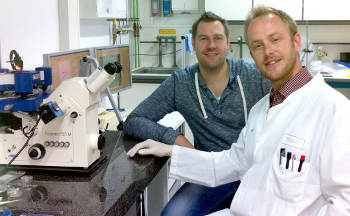JPK Instruments, a world-leading manufacturer of nanoanalytic instrumentation for research in life sciences and soft matter, reports on the current cancer research project of Dr Florian T Ludwig at the Institute of Physiology II, University Hospital Münster, who uses a CellHesion® 200 to measure the adhesive forces between tumor cells.
 Mike Wälte and Dr Florian T Ludwig (white coat) with the JPK CellHesion® 200 system at the University of Münster
Mike Wälte and Dr Florian T Ludwig (white coat) with the JPK CellHesion® 200 system at the University of Münster
The Institute of Physiology II is part of the Medical Faculty of the Westfälische Wilhelms-Universität Münster. It brings together the areas of physiology, cell migration and ion transporters through the study of properties of cells on the nanoscale.
Dr Florian T Ludwig is a member of the team of Professor Albrecht Schwab and Dr Christian Stock. These researchers are interested in how ion transport across the plasma membrane affects tumor cell motility and, thus, metastasis. Occurring prior to migration and invasion, one early step of the so-called metastatic cascade is the detachment of single tumor cells or cell clusters from the primary neoplasm. This process is accompanied by a controlled loss of cell-cell adhesions caused by the release of bonds between adhesion molecules such as cadherins. Hence, the adhesion force between tumor cells might predict the tumor's malignancy. Tumor cells that exhibit low cell-cell adhesion forces would represent a highly metastatic phenotype since they detach more easily.
With the help of Mike Wälte from the group of the Head of the Institute, Professor Hans Oberleithner and Dr Hermann Schillers, Dr. Ludwig measures cell-cell adhesion forces in tumor cells. This is based on the group's distinguished expertise of nearly two decades' experience in atomic force microscopy, AFM.
For the experiments, a single tumor cell is attached to the cantilever of a JPK CellHesion® 200 system using a bionic cell adhesive. A second, adherent tumor cell is then approached with the cantilever until the two cells come into contact. After a defined contact time, the cantilever is retracted until the two cells are separated. The strength of the cell-cell bonds that formed while the cells were in contact is estimated by recording the force necessary to separate the cells. Here, the key feature of the CellHesion® 200 system is its ability of the cantilever sensor lifting system to travel more than 110 µm giving a clear benefit for the researchers whose aim is to separate two tumor cells both gently, reproducibly and efficiently without damage. With the technique described here, cell-cell adhesion forces can be quantified.
For more details about JPK's CellHesion® 200 system and applications for the bio & nano sciences, please contact JPK on +49 30533112070, visit the web site, or see more on Facebook and on YouTube.
About JPK Instruments
JPK Instruments AG is a world-leading manufacturer of nanoanalytic instruments - particularly atomic force microscope (AFM) systems and optical tweezers - for a broad range of applications reaching from soft matter physics to nano-optics, from surface chemistry to cell and molecular biology.
From its earliest days applying atomic force microscope (AFM) technology, JPK has recognized the opportunities provided by nanotechnology for transforming life sciences and soft matter research. This focus has driven JPK's success in uniting the worlds of nanotechnology tools and life science applications by offering cutting-edge technology and unique applications expertise.
Headquartered in Berlin and with direct operations in Dresden, Cambridge (UK), Singapore, Tokyo and Paris (France), JPK maintains a global network of distributors and support centers and provides on the spot applications and service support to an ever-growing community of researchers.